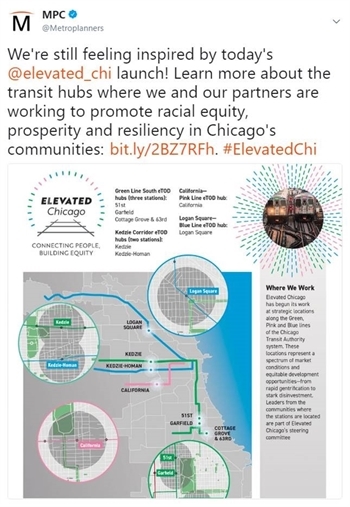A collaborative new initiative will transform transit nodes into hubs of opportunity and connection
 By Kendra Freeman and Sawyer Middeleer, Research Assistant
By Kendra Freeman and Sawyer Middeleer, Research Assistant - December 18, 2017
“Our community is fragile. It looks and feels diverse, but if we don’t do the right thing, it won’t be diverse for long.” -Lucy Gomez-Feliciano, Logan Square Neighborhood Association
Last week, Metropolitan Planning Council joined 16 other non-profit, government and private organizations to publicly launch Elevated Chicago, a pioneering initiative to transform the half-mile radius around seven transit stations into hubs of opportunity and connection across our region’s vast transit system. Elevated Chicago will unite local community advocates from Logan Square, Kedzie Corridor, Garfield Park, Washington Park, Bronzeville and Woodlawn, as well as public officials and business leaders to promote racial equity, prosperity and climate resiliency through catalytic equitable transit-oriented development (eTOD).
Elevated Chicago was made possible by support from the Strong, Prosperous, And Resilient Communities Challenge (SPARCC), a three-year, $90 million national initiative to invest in and amplify local efforts to ensure that new investments, particularly around transit nodes, lead to equitable, sustainable and healthy outcomes for everyone. SPARCC is an initiative of Enterprise Community Partners, the Federal Reserve Bank of San Fancisco, The Low Income Investment Fund, and the Natural Resources Defense Council. The initiative has received funding support from the Ford Foundation, The JPB Foundation, The Kresge Foundation, the Robert Wood Johnson Foundation, and The California Endowment. Chicago was chosen earlier this year to join a cohort of six cities around the country that will receive SPARCC grant money, technical assistance and capital investment support over the next three years.

To celebrate the launch of Elevated Chicago, over 150 people convened at the Federal Reserve Bank for a day of presentations and panel discussions given by representatives from the four community areas and key institutional partners. Community leaders from the Elevated Chicago community areas located on the Blue, Pink and Green lines of the Chicago Transit Authority (CTA) system presented the organizing and strategic planning work that residents have achieved over the past six months. Elevated Chicago is a truly community-driven initiative that empowers residents in the communities to identify obstacles to inclusive growth and prioritize policy and capital investment initiatives. Leaders from these communities are positioned in Elevated Chicago’s steering committee and share decision-making on capital deployment, creating an agenda for systems change and measuring outcomes and expanding knowledge sharing across Elevated sites.
Even though each Elevated community faces unique challenges, there are many issues that touch every community in some way. It’s no secret that Chicago is one of the most segregated cities in the country, and that segregation is largely responsible for large disparities in quality of life, employment, and wealth between communities. Community presentations and panel discussions at the launch highlighted a number of innovative approaches to addressing these pressing challenges. Lucy Gomez-Feliciano from the Logan Square Neighborhood Association described a grassroots effort to preserve housing affordability around the 606 trail with a new zoning ordinance. Ghian Foreman of the Washington Park Development Group and the Greater Southwest Development Corporation is promoting business incubation to bring back residents who left after decades of disinvestment. Washington Park and Logan Square are two very different examples of the impact of displacement on Chicago neighborhoods. Rapid growth with lack of affordability in some areas and sustained disinvestment in others have both contributed to widespread displacement and population loss in our city and region. Elevated Chicago seeks to disrupt this narrative by prioritizing equity as a driver in the community development process and demonstrating innovation in the approach to investments around the targeted transit stations.
To support the working groups and the Elevated Chicago steering committee achieve their desired policy and systems change outcomes, a Leadership Committee that will engage the public and private sectors will join the Elevated team. This group will lend its institutional clout and expert guidance to open pathways to achieving policy and systems change goals through public-private and interjurisdictional partnerships.
Tuesday’s launch was the culmination of many months of work by the Elevated Chicago, and this is still only the beginning. In early 2018, Elevated Chicago will begin the real work of helping the four communities implement their visions for change.